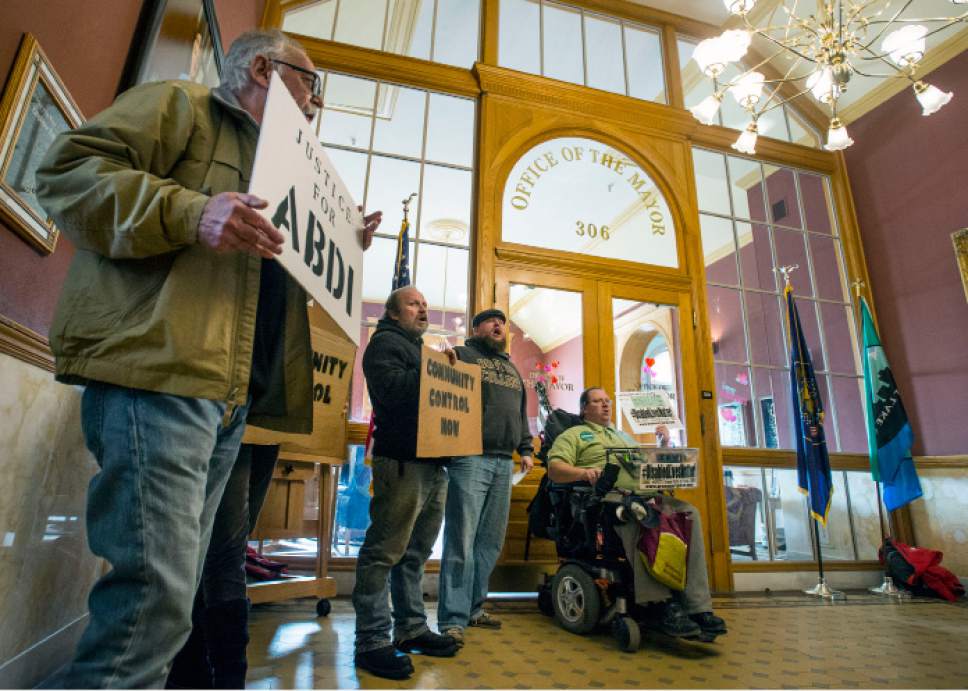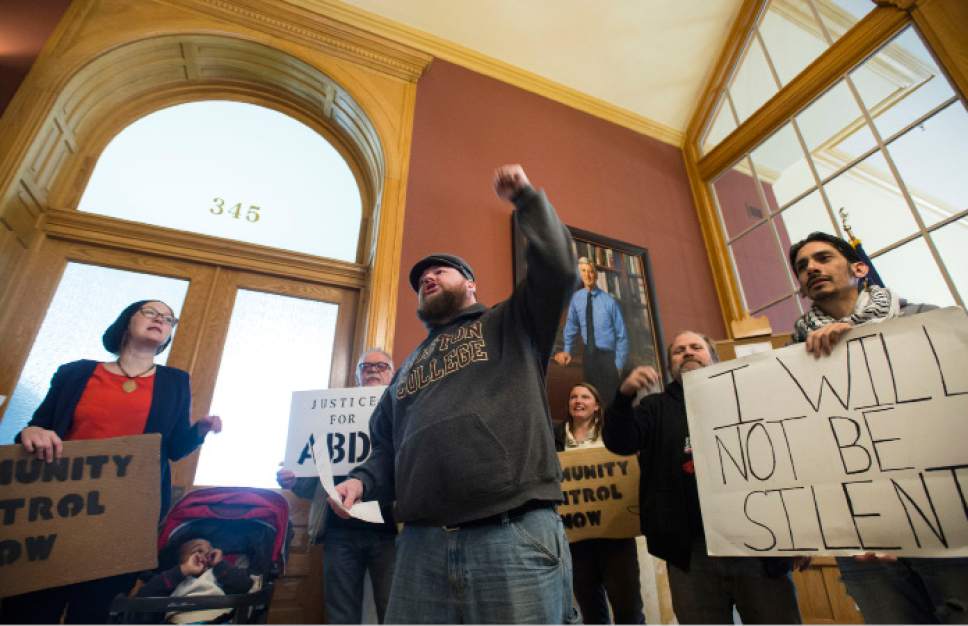This is an archived article that was published on sltrib.com in 2017, and information in the article may be outdated. It is provided only for personal research purposes and may not be reprinted.
A draft policy to release body-camera footage no more than six months after any officer-involved shooting was at the same time heralded by Salt Lake City's mayor's office as a compromise between public interest and due process and denounced by the county attorney as a threat to constitutional rights.
The draft was sent to news outlets Monday, a week to the day that the public first saw video of two officers shooting then-17-year-old Abdullahi "Abdi" Mohamed during a February 2016 altercation outside a downtown Salt Lake City homeless shelter.
Mayor Jackie Biskupski said in a news release that the draft policy was informed by the city's Human Rights Commission and "balances the need for transparency with the legitimate need to provide due process and to protect records during investigations and judicial proceedings."
District Attorney Sim Gill said he heard about the draft an hour before it was released and that it sets an arbitrary point at which the city will violate a legal right to sate a lusting public.
"Why at 180 days? If the issue is protected and classified at its inception, does that status change at 180 days?" Gill said. "She needs to be a mayor, and I'm trying to be a district attorney."
Mayor's spokesman Matthew Rojas replied in a text message that the city is "seeking feedback from everyone," including Gill, and that "[w]e will certainly take his concerns under advisement."
The draft policy would require outside agencies investigating or prosecuting cases related to officer-involved shootings to provide the city's police department with a written argument against public disclosure, and to renew that request every 30 days until 180 days, when the footage would be released regardless of related investigations, prosecutions or civil suits.
Mohamed, now 18, faces two felony charges after police say he used a hollow metal rod to assault a man after a drug purchase near the shelter.
Gill's office had declined to release the two officers' bodycam footage, and had signaled its intent to appeal a decision by the State Records Committee to grant the American Civil Liberties Union of Utah access to the footage.
But when the video was shown in juvenile court last Monday as part of the prosecution's case against Mohamed, Gill said the time had come to release all video evidence. Gill said then that he had protected "the rights of the accused" and "the integrity of the process." Mohamed's attorneys possessed the footage for seven months, he said Monday, with nothing to stop them from releasing it themselves.
"It doesn't help their client, does it?" he said. "If I had released it prior to that, they would have made a huge ruckus out of it."
Gill added: "If we release that evidence knowing that it is evidence of a crime, and that leads to pretrial publicity, and I want to rely on that evidence, your defense attorney has every right to object to that prosecution because your due process rights have been violated."
He favors release of bodycam footage as soon as possible, he said, but a solution must satisfy his ethical and moral responsibility to the state and to the accused.
"I'm not running away from it. The easiest thing for me would have been to say the hell with it" and accept the mayor's policy.
For others, the draft policy doesn't go far enough. Earlier Monday, 11 members of a group called Utah Against Police Brutality sat outside Biskupski's office to demand access to the draft, which they now have until March 1 to comment on.
Group member Jacob Jensen said the six-month limit is progress, but the policy would still allow officials to shield officers from public scrutiny in the meantime.
The good news, Jensen said, is that the public has been invited to give input on the policy.
"We look forward to making those comments to the mayor's office and working with them to make sure that the bodycam footage is truly public purview."
Salt Lake City Police Chief Mike Brown said Mohamed's shooting prompted a fruitful community discussion about how best to accomplish the level of transparency that he said Biskupski has pushed for since taking office.
"We're trying to find that very delicate balance," Brown said.
ACLU of Utah staff attorney Leah Farrell said the mayor's draft policy was "a really positive step" toward increased transparency, adding that the ACLU will keep "a watchful eye" on the 30- and 180-day periods to make sure they don't become "default release times."
"We believe, as it appears they do, that these are public records and that they should be released as soon as possible," Farrell said.
Gill, meanwhile, proposed a legislative alternative: If criminal charges result from an officer-involved shooting — either against an officer or a civilian — media and other agencies should be able to petition a judge for the video's release within 30 days of the filing.
A judge is more likely to hold dear and correctly assess parties' constitutional rights than members of the State Records Committee, Gill said — whose decision he would be likely to appeal, anyway.
Tribune reporter Tom Harvey contributed to this story.
mpiper@sltrib.com Twitter: @matthew_piper





